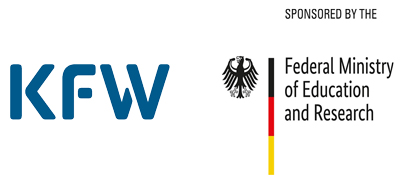July 6, 2023
IAVI welcomes Germany to its list of generous supporters and recognizes the German government as a steadfast advocate and active participant in global health initiatives
Germany commits to 9.2 million Euros for the next five years to support development of a safe, effective, affordable, and accessible tuberculosis vaccine.
Most recently the German Federal Ministry of Education and Research (BMBF) through the KfW Development Bank announced its commitment to contribute 9.2 million euros for the next five years to support an innovative public-private collaboration between IAVI and partners Biofabri and the Tuberculosis Vaccine Initiative (TBVI) to further their development of a safe, effective, affordable, and accessible tuberculosis (TB) vaccine. MTBVAC, the promising vaccine candidate, is currently being developed as a more effective and potentially longer-lasting vaccine for newborns and for prevention of TB disease in adults and adolescents. TB is an airborne disease caused by infection with Mycobacterium tuberculosis (M.tb) and one of the oldest diseases to affect humans. In 2021, an estimated 1.6 million people died because of TB disease (WHO Global Tuberculosis Report 2022). As the COVID-19 pandemic has waned, TB is on track to once again has become the leading infectious cause of death in much of the world. The only licensed TB vaccine, the Bacille Calmette-Guérin (BCG) vaccine, was developed more than 100 years ago.

BMBF is a cabinet ministry in the German government. The Ministry of Education and Research simultaneously provides funding for research projects and research institutions as well as sets the German education policy. Headed by the Federal Minister Bettina Stark-Watzinger, BMBF research funding has the goal of financing the development of new ideas and technologies. KfW Development Bank has been helping the German Federal Government to achieve its goals in development policy and international development cooperation for more than 50 years. On behalf of the German Federal Government, KfW finances and supports programs and projects that mainly involve public sector players in developing countries and emerging economies.
Germany is a shining example of dedication toward improving global health outcomes
With its robust health care system, strong research infrastructure, and commitment to international cooperation, the German government has set a shining example of dedication toward improving global health outcomes through its multi-faceted approach to global health and the impact it has had on promoting well-being worldwide.
Investing in health infrastructure: Germany’s commitment to global health begins at home, with a health care system widely regarded as one of the best in the world. The government’s significant investments in health care infrastructure, including hospitals, clinics, and research centers, have not only improved domestic health care but also positioned Germany as a leader in medical innovation. By fostering an environment conducive to cutting-edge research and development, Germany has been able to contribute groundbreaking discoveries and treatments to the global health community.
Addressing global health challenges: Recognizing the urgency of global health challenges, Germany has been at the forefront of tackling pressing issues such as infectious diseases, immunization, and maternal and child health. The German government actively supports research programs aimed at developing vaccines, treatments, and preventive measures for diseases like HIV/AIDS, tuberculosis, and malaria. Germany has contributed significantly to global immunization efforts, partnering with organizations such as Gavi, the Vaccine Alliance, to ensure access to life-saving vaccines for vulnerable populations in low-income countries. Germany places great importance on ensuring global access to vaccines and promoting vaccine equity. Germany has implemented bilateral agreements to supply vaccines directly to countries in need. By leveraging its vaccine manufacturing capabilities, Germany plays a crucial role in bridging the global immunization gap and reducing health disparities between nations.
Support for low- and middle-income countries: Through its development agency, the German Federal Ministry for Economic Cooperation and Development (BMZ), Germany invests in health programs in developing countries. BMZ supports initiatives focused on disease prevention, health infrastructure development, and capacity building. By working closely with partner countries, Germany aims to build resilient health systems that can effectively respond to emerging health threats.
Collaboration and diplomacy: Germany embraces diplomacy as a powerful tool to advance global health goals. The German government actively engages in international partnerships, alliances, and forums to promote knowledge exchange, share best practices, and coordinate responses to global health emergencies. Germany’s leadership role in the World Health Organization and its active participation in the G7 and G20 summits provide platforms to influence policy decisions, mobilize resources, and foster global cooperation in addressing health issues.
Responding to pandemics: The COVID-19 pandemic demonstrated the importance of global solidarity and cooperation in combating health crises. Germany swiftly responded to the pandemic by allocating resources, expanding testing capacities, and implementing effective public health measures. Additionally, the German government actively contributed to global initiatives such as COVAX, which aims to ensure equitable access to COVID-19 vaccines worldwide.
Germany’s unwavering commitment to global health is a testament to its leadership and humanitarian values. By investing in health infrastructure, addressing global health challenges, supporting developing countries, engaging in international collaboration, and responding decisively to pandemics, Germany has established itself as global health leader. As the world faces increasingly complex health threats, Germany’s dedication serves as an inspiration for other nations to prioritize global health and work together toward achieving healthier and more resilient societies worldwide.